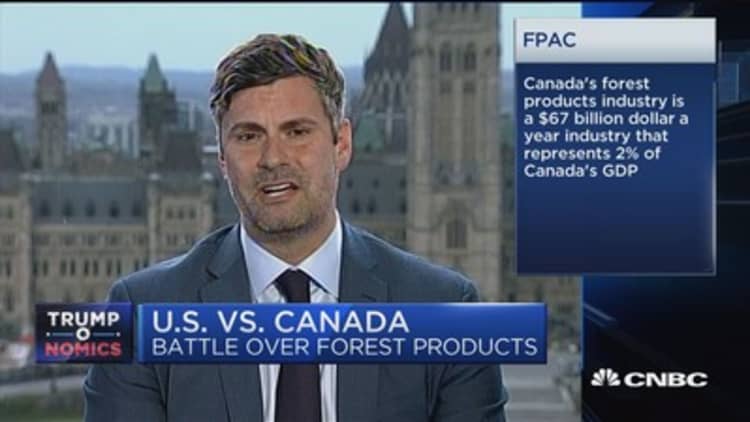
The new U.S. tariff averaging 20 percent on Canadian timber imports shows how serious President Donald Trump is about enforcing trade rules, Commerce Secretary Wilbur Ross told CNBC on Tuesday.
"The Trump administration has been much more focused on enforcement than had been true previously," he said, taking a veiled swipe at former President Barack Obama's approach to trade.
In an interview on "Squawk Box," Ross said, however, the new lumber tariff, a result of a long-running dispute, is not the beginning of a trade war with Canada. He said it showed Trump making good on promises to hold Canada accountable for unfair practices such as those that have hurt American dairy farmers.
The president, while traveling in Wisconsin last week, was particularly troubled by the plight of U.S. dairy farmers, said Ross, a billionaire who made his fortune investing in distressed assets.
Trump tweeted a warning about the dairy issue Tuesday morning.
Canada's dairy sector is protected by high tariffs on imported products and controls on domestic production as a means of supporting prices that farmers receive. It's frequently criticized by other dairy-producing countries.
U.S. dairy industry groups want Trump to urge Canadian Prime Minister Justin Trudeau to halt a pricing policy that's disrupted some U.S. dairy exports and prioritize dairy market access in NAFTA renegotiation talks.
Ross said the U.S. needs to defend its borders to the north and the south. He accused Canada of engaging in protectionism, and said it is evidence the North American Free Trade Agreement with Canada and Mexico has been a "terrible arrangement."
While the White House wants to renegotiate NAFTA, Ross said the lumber tariffs are "a precise set of tariffs on a very precise set of imports."
"The reason we're putting it on is that Canada's forests are owned by the various provinces" that charge subsidized prices to the lumbermen there who in turn get an advantage when they export into the U.S., Ross said.
"It seems simply unfair because in the U.S. most of the forests are privately owned, and therefore they pay full-market rate for the stumpage," the charges for logging on land, he said.
However, Forest Products Association of Canada CEO Derek Nighbor says a lumber tariff would only hurt blue-collar Canadian communities and U.S. consumers in the end.
"In Canada, I think about states like Ohio and Wisconsin and Pennsylvania that responded to the Trump agenda in the last election, and it's a lot of the blue-collar communities in Canada that will be hurt from this," Nighbor told CNBC's "Power Lunch."
"The thing that's bizarre about this, is that there's not a win in this for the U.S. consumer. We are seeing an uptick in housing starts in the U.S. and our forecast suggests that will continue for the next few years. U.S. industries cannot satisfy domestic demand. At the end of the
Nighbor called the process "really frustrating" and the "definition of insanity" for Canadian lumber companies and mills.
"This is the fifth time in 34 years we've been through this. The previous four times, Canada has been proven right," Nighbor said. "There's been no material change in the way we're doing business in Canada so it's really frustrating. Because it is like the definition of insanity in terms of going and asking the same questions and expecting a different outcome."
Ross said the president wants to stop the hypocrisy of nations who say they support free trade but do otherwise. Singling out Europe,
"If need be, we will do more to defend our borders," he said.
— Reuters and CNBC's Rachel Cao contributed to this report.



